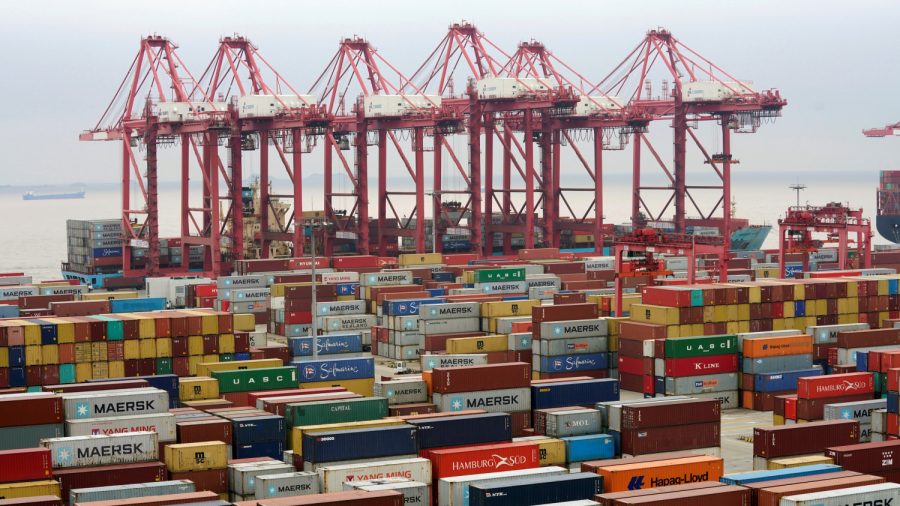WASHINGTON—The U.S. trade deficit declined to its lowest level since June 2018, mainly led by a dramatic drop in the trade shortfall with China, suggesting that President Donald Trump’s trade policy is working.
The United States’ deficit in the trade of goods and services was $49.4 billion in February, falling 3.4 percent from the previous month, according to Commerce Department data released April 17.
The U.S. trade deficit in goods with China dropped 28 percent in February, with imports falling 20 percent and exports increasing 18 percent.
The deficit came in well below estimates, driven by strong exports of civilian aircraft and weak imports of industrial supplies and capital goods.
The unexpected narrowing in the deficit was partly due to a surge in exports of civilian aircraft. This trend, however, may not be sustainable especially after the grounding of Boeing 737 Max planes, according to experts.
A $1.8 billion narrower trade deficit in February followed a surprise $8.8 billion tightening in January. And this trend is expected to provide a significant contribution to economic growth in the first quarter of 2019, according to Citi.
The narrowing in the trade deficit in the past two months “can be largely ascribed to a $7.6 billion tightening of the bilateral merchandise balance with China,” Citi economist Andrew Hollenhurst wrote in a report.
“This U.S.-China narrowing is due to bounce-back from front-loading of imports ahead of expected tariff increases, as well as an uptick in U.S. exports of agricultural products.”
Many Chinese exporters front-loaded their shipments last year, due to uncertainty surrounding trade tensions between Washington and Beijing. However, that trend ran out of steam after both sides signaled optimism about the trade talks.
Shipments of U.S. soybeans also jumped 16 percent to $1.4 billion, buoyed by purchases from China and the EU.
China, the world’s largest soybean buyer, slapped 25 percent tariffs on U.S. soybeans as part of the trade conflict last year, causing a significant drop in soybean imports from the United States. However, Beijing recently resumed purchases of U.S. soybeans amid continued trade talks.
There is a downside risk to soybean exports, Citi warns, as swine-flu has decreased the demand for soybean meal. This risk, however, could be partially offset by an uptick in the export of U.S. pork to China.
The European Union also doubled its U.S. soybean imports since July as part of the new trade talks between Washington and Brussels. American soybeans now account for 69 percent of the EU market. The trade deficit with the EU fell further in February, reaching a three year low.
According to the White House Council of Economic Advisers (CEA), net imports of crude oil and petroleum products in February were the lowest on record since February 1991.
“This data is further proof that the U.S. is becoming more energy independent, esp. when coupled with the fact that the U.S. is now the largest producer of crude oil and natural gas in the world,” stated CEA in a tweet on April 17.
The United States and China are still in talks to strike a comprehensive trade deal, and the White House has postponed additional tariff hikes on Chinese imports for now.
Trump has sought to take a tougher stance on China’s decades-long protectionist and trade-distorting policies and launched a tariff campaign early last year. The trade tension between the United States and China escalated when Trump imposed tariffs on nearly $250 billion worth of Chinese goods. Beijing retaliated with levies on $110 billion worth of American products.
Contrary to popular belief, Trump’s tariffs have worked and have convinced Chinese leader Xi Jinping to sit down with Trump to address Washington’s concerns with respect to intellectual property theft, forced technology transfer, and cyber hacking, according to Larry Kudlow, the top White House economic adviser.
“The Chinese have acknowledged these problems for the first time. They were in denial,” he told reporters on April 3.
“I think that has led to good negotiations,” he said. “This is the largest scale, deepest discussion of trade between the two countries in history.”
From The Epoch Times

